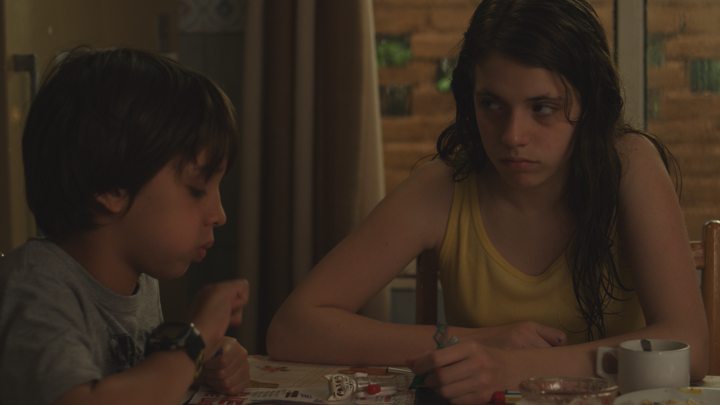
 Montevideo, Uruguay- A divorced father gathers his two kids into the car in the early hours of the morning. Apparent are the varying levels of enthusiasm amongst the family member’s as they depart Uruguay’s capital city, heading out on a family vacation. They set out while it is still dark, and soon it begins to rain. The focus of the early scenes is entirely the charters (as is the entire film really); we see only the inside of the car. Do the filmmaker’s take Uruguay’s scenery for granted? Sadly, not enough countryside is shown.
Montevideo, Uruguay- A divorced father gathers his two kids into the car in the early hours of the morning. Apparent are the varying levels of enthusiasm amongst the family member’s as they depart Uruguay’s capital city, heading out on a family vacation. They set out while it is still dark, and soon it begins to rain. The focus of the early scenes is entirely the charters (as is the entire film really); we see only the inside of the car. Do the filmmaker’s take Uruguay’s scenery for granted? Sadly, not enough countryside is shown.
When the family arrives at the hot springs resort it’s pouring rain, and because of the stormy weather, the resort has had to close the pool. The films biggest weakness is later, when the rain finally stops, nobody notices. Alberto, (Nestor Guzzini) in his appearance and mannerisms, slightly resembles James Gandolfini's Tony Soprano. He plays the affable but slightly inept dad. He gets on well with his youngest Federico (Joaquin Castiglione), but communicating with his teenage daughter Lucia (Malú Chouza) proves more difficult.
With Alberto’s single-track plan of swimming in the pool a bust, the family uncomfortably realizes they need to get along in the cramped hotel room, at least until the rain stops, but it never does! During Alberto’s attempts to find family pursuits beyond the pool, the bored looks of the kids make this forced family time painful to watch. Because of the close quarters and constant trifles, all three characters eventually set out on their own hoping to meet other people. Federico goes out to play with another boy. Alberto spends his time chatting up the resort’s pretty desk agent. Lucia stares longingly and sighs loudly yearning for adventure. Eventually she finds it, and it takes her a little to far.
Tanta Agua’s beauty is in two things: its overall simplicity as a production and as a story, and the fact that it’s set in Uruguay. But these things of “beauty” do not relate to aesthetics. Contrarily, the sets are drab, simple, and sometimes exceptional. The resort is cramped and tacky. The family car is small, an older model that may break down at any moment. We only see deserted streets, houses reminiscent of southern Europe. Down by the docks, giant cranes sit motionless, everything under gray skies.
The complications of their lives as a divorced family, their differing attention spans, and disagreements in their interests of board games, of food, of whether there should be TV, are all part of the simple interactions of family. Directors Ana Guevara and Leticia Jorge investigating these interactions and variations on the theme, looking at the subject matter of everyday life, the directors highlight the joy of the everyday (and the rainy day).